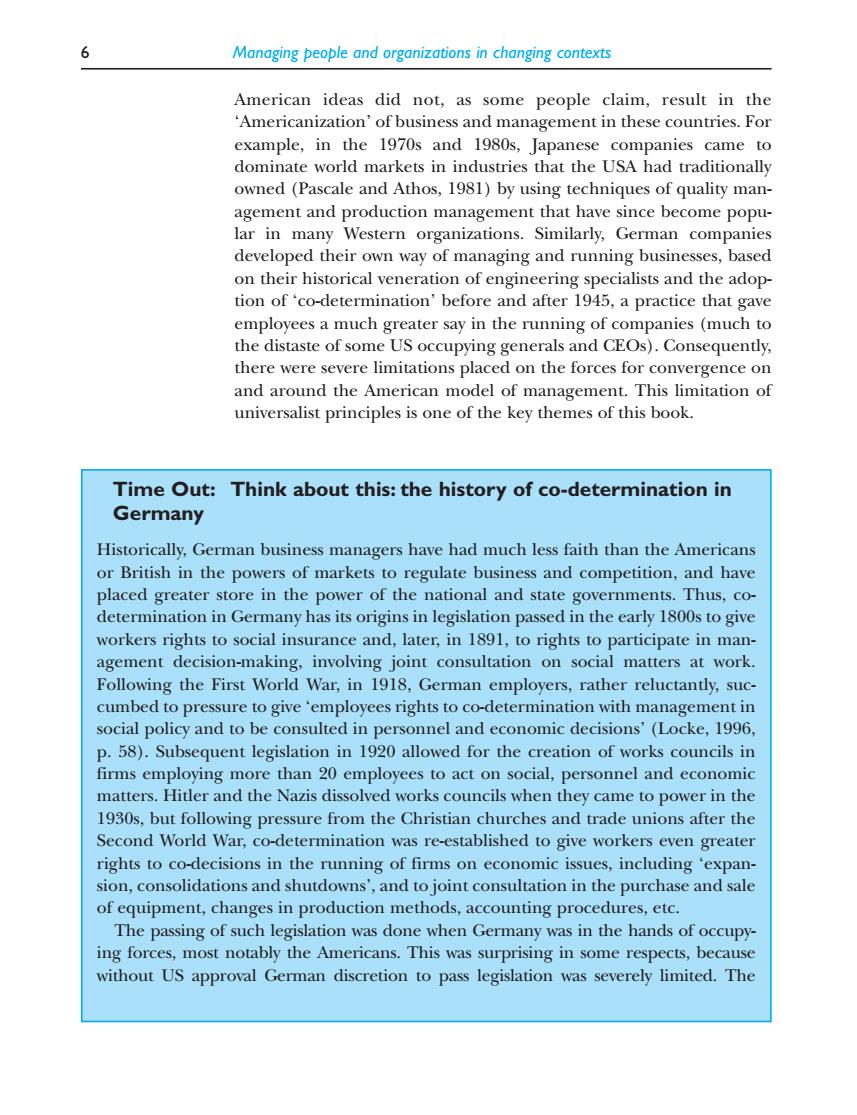正在加载图片...

Managing people and organizations in changing contexts American ideas did not,as some people claim,result in the 'Americanization'of business and management in these countries.For example,in the 1970s and 1980s,Japanese companies came to dominate world markets in industries that the USA had traditionally owned (Pascale and Athos,1981)by using techniques of quality man- agement and production management that have since become popu- lar in many Western organizations. Similarly,German companie developed their own way of managing and running businesses,based on their historical veneration of engineering specialists and the adop- tion of 'co-determination'before and after 1945,a practice that gave employees a much greater say in the running of companies (much to the distaste of some US occupying generals and CEOs).Consequently, there were severe limitations placed on the forces for convergence on and around the American model of management.This limitation of universalist principles is one of the key themes of this book. Time Out: Think about this:the history of co-determination in Germany Historically,German business managers have had much less faith than the Americans or British in the powers of markets to regulate business and competition,and have placed greater store in the power of the national and state governments.Thus,co determination in Germany has its origins in legislation passed in the early 1800s to give workers rights to social insurance and,later,in 1891,to rights to participate in man- agement decision-making,involving joint consultation on social matters at work Following the First World War,in 1918,German employers,rather reluctantly,suc- cumbed to pressure to give 'employees rights to co-determination with management in social policy and to be consulted in personnel and economic decisions'(Locke,1996 p.58).Subsequent legislation in 1920 allowed for the creation of works councils in firms employing mor than 20 employees to act on social,personnel and economic matters.Hitler and the Nazis dissolved works councils when they came to power in the 1930s,but following pressure from the Christian churches and trade unions after the Second World War,co-determination was re-established to give workers even greater rights to co-decisions in the running of firms on economic issues,including 'expan- sion,consolidations and shutdowns',and to joint consultation in the purchase and sale of equipment,changes in production methods,accounting procedures,etc The passing of such legislation was done when Germany was in the hands of occupy- ing forces,most notably the Americans.This was surprising in some respects,because without US approval German discretion to pass legislation was severely limited.The American ideas did not, as some people claim, result in the ‘Americanization’ of business and management in these countries. For example, in the 1970s and 1980s, Japanese companies came to dominate world markets in industries that the USA had traditionally owned (Pascale and Athos, 1981) by using techniques of quality management and production management that have since become popular in many Western organizations. Similarly, German companies developed their own way of managing and running businesses, based on their historical veneration of engineering specialists and the adoption of ‘co-determination’ before and after 1945, a practice that gave employees a much greater say in the running of companies (much to the distaste of some US occupying generals and CEOs). Consequently, there were severe limitations placed on the forces for convergence on and around the American model of management. This limitation of universalist principles is one of the key themes of this book. 6 Managing people and organizations in changing contexts Time Out: Think about this: the history of co-determination in Germany Historically, German business managers have had much less faith than the Americans or British in the powers of markets to regulate business and competition, and have placed greater store in the power of the national and state governments. Thus, codetermination in Germany has its origins in legislation passed in the early 1800s to give workers rights to social insurance and, later, in 1891, to rights to participate in management decision-making, involving joint consultation on social matters at work. Following the First World War, in 1918, German employers, rather reluctantly, succumbed to pressure to give ‘employees rights to co-determination with management in social policy and to be consulted in personnel and economic decisions’ (Locke, 1996, p. 58). Subsequent legislation in 1920 allowed for the creation of works councils in firms employing more than 20 employees to act on social, personnel and economic matters. Hitler and the Nazis dissolved works councils when they came to power in the 1930s, but following pressure from the Christian churches and trade unions after the Second World War, co-determination was re-established to give workers even greater rights to co-decisions in the running of firms on economic issues, including ‘expansion, consolidations and shutdowns’, and to joint consultation in the purchase and sale of equipment, changes in production methods, accounting procedures, etc. The passing of such legislation was done when Germany was in the hands of occupying forces, most notably the Americans. This was surprising in some respects, because without US approval German discretion to pass legislation was severely limited. The